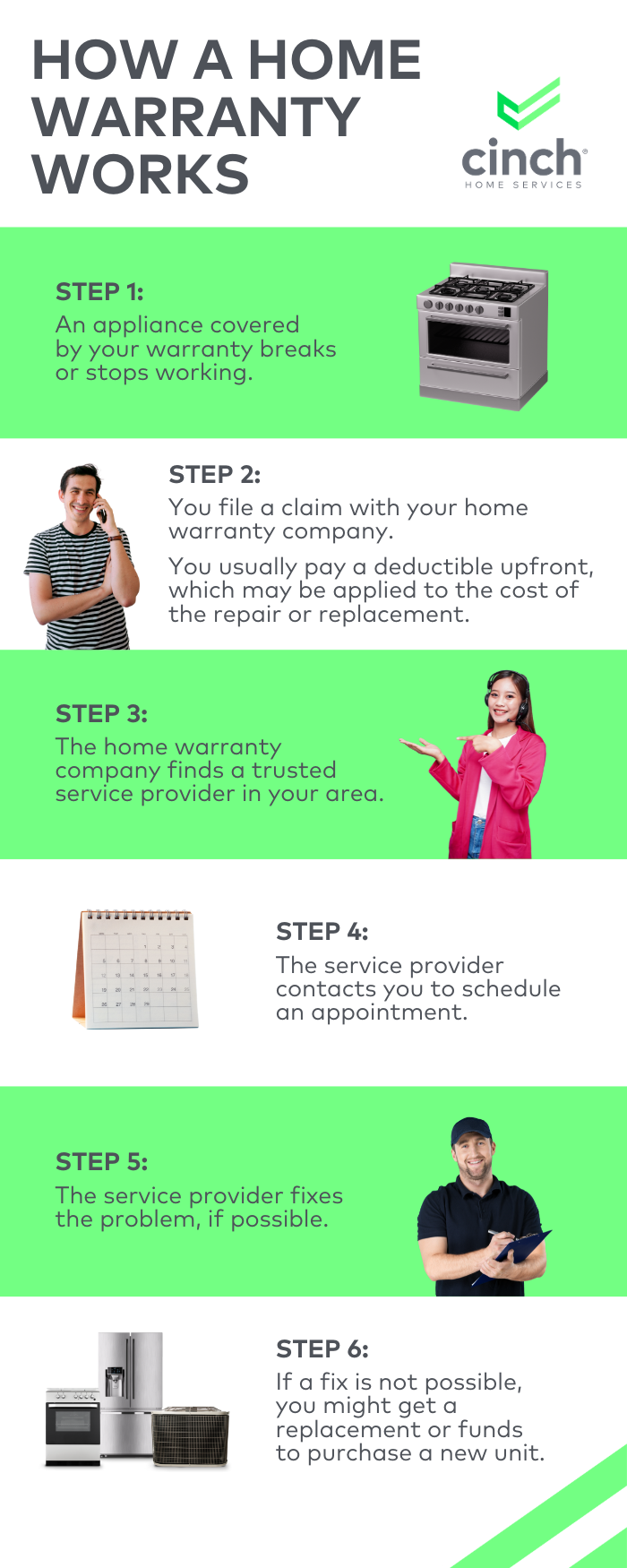How Does a Home Warranty Work?
Key takeaways:
Home warranty coverage varies by provider and plan, so it's essential to thoroughly review the contract details to understand what is and isn't covered.
When you request service under a home warranty, there's typically a deductible payment, and the provider will coordinate repairs or replacements with approved service professionals.
While home warranties offer financial protection against unexpected repair costs, consider factors like the age of your home and appliances to determine if coverage suits your needs.
Home warranties can benefit both home buyers and sellers, providing peace of mind against unexpected appliance or system failures.
The general population isn’t the only thing that’s aging.
According to Statista, nearly 10% (14.6 million) of all homes in the United States were built between 2000 and 2009. Although that may feel like it was just yesterday to some of us, the reality is that these homes are now 15-25 years old. And a bigger part of the other 90% are probably even older.
Like our bodies, our homes require more maintenance and care over time. Thankfully, home warranties are an option that can step in to protect your budget from costly repairs and replacements as our homes and appliances age.
As the business of home warranty plans and extended warranties for appliances has grown, people are beginning to recognize the benefits of having home warranty protection. In fact, since 2023, the number of home warranty providers has increased by 2.3% compared to 2022. Let’s take a deep dive into how home warranties work and explore ways that they can help you avoid costly repairs.
What is a home warranty?
In short, a home warranty is a service contract between a homeowner and a company that helps cover the repair and maintenance costs of home systems and appliances for a given period.
It is important to note that a home warranty is not home insurance (more on this later). People sometimes confuse the terms home warranty (or home protection plan), homeowners insurance, and extended warranties, but they are very different. If you are shopping for home protection, ensure you understand the definition of a home warranty before enrolling.
How do home warranties work?
A home warranty helps protect your budget when significant home appliances and built-in systems fail due to everyday wear and tear. When things go wrong, a home warranty company should step up. Home warranty protection helps cover repairing (or, in some cases, replacing) items covered in the plan of choice - from microwaves and washing machines to refrigerators and air conditioning (A/C) systems. Your home warranty plan is a contract between you and a home warranty company that you can use to file claims and get service.
Remember, the details of your coverage depend on the contract details you agree to. You’ll have several plans and providers to choose from.
So, how do home warranties work in general? Again, the details depend on your provider and home warranty contract. However, here’s a basic overview of what the process generally looks like:

Step 1: An appliance or system covered under your warranty breaks/stops working.
Step 2: You inform the home warranty company and request a service provider. At this time, you usually pay a deductible upfront, which may be applied to the cost of the repair or replacement.
Step 3: The home warranty company contacts a trusted service provider in your geographic area.
Step 4: The service provider contacts you to schedule and confirm the appointment.
Step 5: The service provider fixes the problem, if possible.
Step 6: If a fix isn’t possible, the home warranty company may offer a replacement model with similar features or provide funds to allow you to purchase a unit of your choice (up to a certain amount).
Again, the amount of the deductible will depend on the details of your contract.
How soon can you use your home warranty?
Because different providers have different service agreements for their home warranty plans, it will depend on the plan you have selected.
For most providers, coverage usually starts within 30 days of your first payment – that means you may be able to use the home warranty in the first weeks after activation. However, some plans have clauses for specific items that require a 30-day waiting period, so it’s best to look for your home warranty agreement to determine how those rules apply in your case.
Home warranties work in a way that adds value to your home (for buyer or seller)
As a first-time home buyer, you might not overthink your new home’s major appliances because you’re used to being a renter who calls the landlord when something breaks down. However, when you get a new place, you’ll be responsible for an appliance when it breaks down, and you can’t be sure how old the appliances and systems are or what their state is. Even with a thorough home inspection report, you might not be able to get the full details of an appliance’s pre-existing conditions. A home warranty is a big bonus if a major appliance breaks down shortly after you move in and with normal wear and tear.
Similarly, having a standing home warranty can help you sell a home later. If you invest in a home warranty throughout the listing period, you can ensure the property is always in a top-quality state. You don’t want potential buyers to stop by for a real estate viewing only to discover the A/C has broken or the washing machine has flooded, for example. A home warranty allows for prompt repairs, so you can always show your property in its best state.
What does a home warranty cover?
Home warranty plans have different categories of protection. An appliance plan covers select, predefined major appliances, like an oven, washer/dryer, dishwasher and refrigerator.
A built-in systems plan covers the major systems in your home, like heating and cooling, plumbing, electrical, garbage disposal, and garage door openers. Finally, the third plan covers both major appliances and home systems.
You can also request optional coverage and add-ons for more comprehensive coverage. Do your research and read the fine print before signing any paperwork. You can get an overview of Cinch’s home protection plans* and approximate costs online to assess the possibilities.
Do home warranties cover known existing problems?
The difference between home warranty and homeowners insurance
A home warranty covers the service and repair or replacement of your home's major systems and appliances, generally for one year. A home warranty company issues this type of warranty, which differs from homeowners insurance, which provides financial protection in a natural disaster or accident.
While very important, homeowner's insurance does not protect your home appliances and systems from normal wear and tear. Adding a home warranty plan can protect you from costly repairs and replacements not covered by homeowners insurance.
How to get a home warranty that’s right for you
As previously mentioned, having the right home warranty coverage can potentially help you save money on costly repairs. However, there are also many providers and policy options, so finding the right home warranty plan for your household can be challenging. Some factors to consider are:
- The age of your house
- The systems that you have in your household
- The age of your appliances
- Do you prefer a higher premium or higher deductible?
With a home warranty, you can rest easy knowing that such failures will be covered, at least in part. Whether it’s the A/C or washing machine, you can count on quick help to ensure you and your loved ones remain happy and comfortable at home.
* Subject to plan terms and conditions.
*The information in this blog library is intended to provide general guidance on home warranties, and on the proper maintenance and care of systems and appliances in the home. Not all of the topics mentioned are covered by our home warranty or maintenance plans. Please review your home warranty contract carefully to understand your coverage.
*Our blog library may link to third-party sites that offer products, services, coaches, consultants, and/or experts. Any such link is provided for reference only and not intended as an endorsement or statement that the information provided by the other party is accurate. We are not compensated for any products or services purchased from these third-party links.
A home warranty helps cover repair and replacement costs in case major appliances or systems are damaged. Here’s how a home warranty works.

